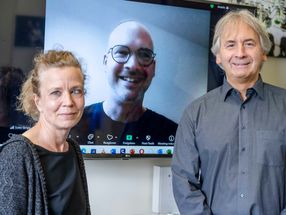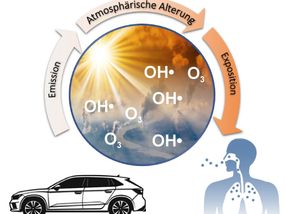Safe use of nanoparticles
BASF toxicologists participate in an EU research project
Scientists from BASF are successfully participating in strategic research projects funded by the European Union. As of April 2005, for example, BASF experts are cooperating with 23 partners from seven EU countries in an important large-scale project aimed at developing methods for the safe use of nanoparticles: Nanosafe2. This European research project brings together scientists from leading companies in industry, startups, and selected research institutes and universities. Of the total budget of approximately EUR12.4 million, around EUR7 million is being provided by the EU's research funding program and the remainder by the companies involved.
The nanosciences are considered to be a key technology of the 21st century, and this is supported by a rapidly growing range of possible applications. Nanotechnology is acting as a motor for new materials and innovative solutions in the areas of energy, medicine and environmental protection. Appropriate research into safety is therefore crucial to the dynamic and sustainable development of these new fields. "BASF's involvement in the Nanosafe2 project is a good example of our proactive stance in the area of risk avoidance," said Dr. Marcos Gomez from the University Relations and Research Planning department, who coordinates BASF's involvement in EU projects.
The key goal of the Nanosafe2 research program is to establish processes to detect, track and characterize nanoparticles. Such methods are a prerequisite for determining any possible risks to man or the environment, and for further optimizing the safety of production processes and plants. Nanosafe2 looks at the entire lifecycle of nanoparticles, from their production and storage through to transport and use in a finished product. The results of the research will subsequently be made available worldwide in the form of databases, official procedures and workshops.
"As part of the EU project, we will be carrying out studies to increase our understanding of the possible health risks associated with the inhalation of nanoparticles," explained Dr. Edgar Leibold from BASF's Toxicology department. Currently, there are not enough scientific data on how certain nanoparticles behave inside the body, so Nanosafe2 will play an important role in this regard. Because the emphasis of the project lies on workplace and plant safety, BASF is also involved in developing physical measurement methods and measuring equipment to reliably detect nanoparticles. "The goal of Nanosafe2 is to ensure the safe use of nanoparticulate materials," said Leibold. "We are excited about being involved in this project."
Most read news
Other news from the department science

Get the chemical industry in your inbox
By submitting this form you agree that LUMITOS AG will send you the newsletter(s) selected above by email. Your data will not be passed on to third parties. Your data will be stored and processed in accordance with our data protection regulations. LUMITOS may contact you by email for the purpose of advertising or market and opinion surveys. You can revoke your consent at any time without giving reasons to LUMITOS AG, Ernst-Augustin-Str. 2, 12489 Berlin, Germany or by e-mail at revoke@lumitos.com with effect for the future. In addition, each email contains a link to unsubscribe from the corresponding newsletter.





























































